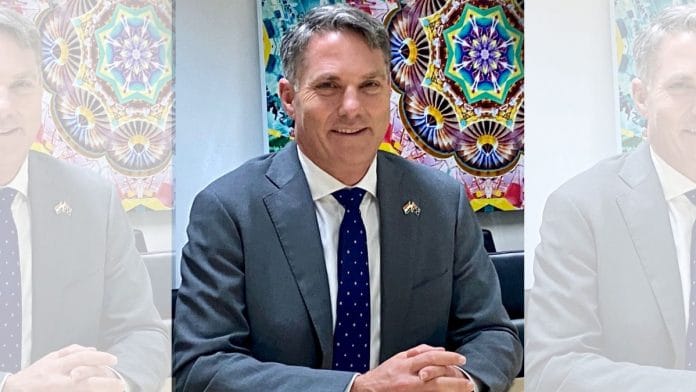New Delhi: Australia’s Deputy Prime Minister and minister for defence, Richard Marles, said Thursday that Canberra and New Delhi share a similar kind of relationship with China — their “largest trading partner and biggest security anxiety”, thus stressing on the need for greater alignment between India and Australia.
In an interaction with a select group of journalists before departing India, Marles — who had been on a three-day visit here — also stressed on the fact that India remains central to Australia’s global view and hence hopes for greater strategic and security cooperation between both countries in the future.
“We see India completely central to Australia’s global view. There’s probably never been a moment in our two countries’ respective histories where we have been more strategically aligned,” the Australian Deputy PM said.
“For Australia China is our largest trading partner and biggest security anxiety,” he said, adding that it is the same for India. Thus, he said, it is important that both countries — India and Australia — be “friends and reconcile” these two aspects.
“China is seeking to shape the world around us in a way that we’ve not seen before. And that’s really evolved in the last decade… And we are experiencing particularly recently in the last couple of years more assertive Chinese behaviour. We see a lot of that in the South China Sea and we’ve seen that with respect to the Line of Actual Control (LAC between India and China),” said Marles.
On the ongoing India-China military standoff, and particularly with respect to the Galwan incident of June 2020, when 20 Indian soldiers lost their lives fighting the Chinese, the Australian Defence Minister said, “It was an appalling behaviour towards the Indian soldiers and we stand in solidarity with India with respect to the events”.
“It’s really important that we live in a world where there is a rules-based order, where disputes between countries are resolved against a set of rules and end in a peaceful way, that we don’t live in a world where disputes are resolved by force,” said Marles.
During his visit to India, the Australian Deputy PM met External Affairs Minister S. Jaishankar and Defence Minister Rajnath Singh, to discuss India-Australia Comprehensive Strategic Partnership, which was announced in June 2020 under the country’s former Scott Morrison government.
Marles highlighted, “Australia and India have a shared objective … South China Sea is not an abstract idea for us, it’s where most of our trade passes … Freedom of navigation, freedom of overflight on that body of water is completely central to Australia’s national interests.”
While addressing the National Defence College Wednesday, Marles had said that China’s military build-up is now the “largest and most ambitious” any country has had since the Second World War.
“It is critical that China’s neighbours do not see this build-up as a risk for them. Because without that reassurance, it is inevitable that countries will seek to upgrade their own military capabilities in response. Insecurity is what drives an arms race,” he said at the NDC.
Also read: Raised by single mother, joined Labor party as teenager – Meet Australian PM-elect Anthony Albanese
Quad, AUKUS ‘not security alliances’
India and Australia are also partners under the Quad grouping, with the US and Japan.
The new Australian Prime Minister Anthony Albanese attended the last in-person Quad Summit in Tokyo last month, within just a day of him assuming charge on 23 May.
“The relationship we have with India, our relationship with the US, with Japan, the architecture within the Quad and greater engagement with ASEAN countries — all of this (is) about trying to work with the countries of the region to protect global rules based order,” Marles stressed.
Responding to a query by ThePrint, Marles underscored, “Quad is not a security alliance” and “AUKUS (a grouping of Australia, the US and the UK) is not a security alliance either”.
“AUKUS is technology exchange between Australia, the UK and the US … Delivering for Australia a nuclear-powered submarine, for us a highly capable, long-range submarine is the single-most platform we can have (under AUKUS),” he said.
Quad, he said, is also important for Australia, but defence and security is “not part of it”. “We are very comfortable with pursuing security alliances in different parts, in different ways,” he added.
In the last Quad Summit, the partners had discussed strengthening the maritime domain awareness, which Marles believes is “everything” even as it will help protect the economic assets of the member countries.
(Edited by Poulomi Banerjee)
Also read: ‘There’s a panda in the room’: Why Australia signed historic free trade pact with India






